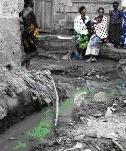Deforestation rates in the Brazilian Amazon declined 14 percent from August 2009 to July 2010, reaching the lowest rates ever recorded for the second consecutive year.
The Salt River Materials Group’s Phoenix Cement Company Plant in Clarkdale, Ariz., achieved a perfect efficiency record for the third straight year.
International Paper and Mississippi River Pulp turn Starbucks Coffee cups into fiber suitable for use in new cups.
In April 2011, Lufthansa will begin a six-month trial with an Airbus A321 engine that will use a 50-50 mix of biofuel and traditional kerosene.

This is the fourth installment of a multi-part series on some of today's problems in land development and how innovative methods collectively known as "Prefurbia" can help overcome them.
Possible solutions include installing wetlands to filter tile drainage, fertilizing fields in the spring, and planting winter crops.
Pilot plant will help identify best ways to purify Hudson River water.
Green tea, grape seed, and bacteriocin extracts have been found to protect food against pathogen contamination in a University of Arkansas study on chicken and turkey hot dogs.

People-powered pump could help prevent spread of dysentery, cholera, and typhoid.
NRG Energy Inc. is launching the nation’s first privately funded, comprehensive electric vehicle infrastructure in Houston, the start of a rollout across Texas, in 2011.
Amid concerns of dangerously elevated lead levels in the reusable grocery bags many earth-conscious consumers have been using for several years, the Earthwise Bag Company Inc. and the Green Bag Company Inc. announced that regular, independent testing has confirmed their reusable grocery bags have consistently met federal standards.
A Sodexo pilot program at eight college campuses has cut kitchen waste by about one-third by tracking and monitoring food waste, lowering both costs and unnecessary methane emissions from decomposing food.
SolarReserve LLC announced a joint venture with GCL Solar Energy Inc. to develop, build and operate solar photovoltaic facilities in the 5 megawatt- to 20 megawatt-sized range on 40 different sites across the United States.

The Philadelphia Eagles announced a plan to power Lincoln Financial Field with a combination of onsite wind, solar and dual-fuel generated electricity, making it the world’s first major sports stadium to convert to self-generated renewable energy.

With advances in nanostructured devices, lower operating temperatures, and the use of an abundant fuel source and cheaper materials, Harvard researchers are increasingly optimistic about the commercial viability of solid-oxide fuel cells.
Emory Conference Center Hotel, Atlanta's first LEED-Silver Certified Conference Center Hotel, is redoubling its recycling efforts by finding interesting ways to recycle partially used soap and shampoo.
Approximately 13 million metric tons of rare earth elements exist within known deposits in the United States, according to the first-ever nationwide estimate of these elements by the U.S. Geological Survey.
The U.S. Green Building Council has introduced a new program designed to streamline and create capacity for the LEED building certification process. LEED Automation enables LEED Online, the online tool projects use to submit documentation and certify LEED projects, to interact with third-party technology platforms.
The global firm will seek to grow its business in developing countries while minimizing its environmental footprint.
Duke economist Martin Smith suggests the agency should also consider the potential health and environmental effects of salmon production that might stem from the fish's faster growth and less need for feed.